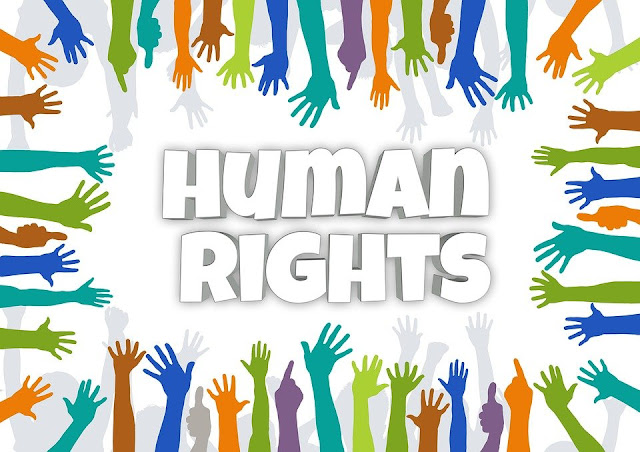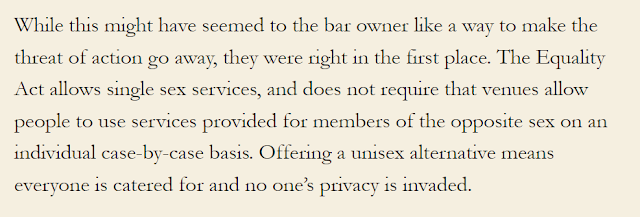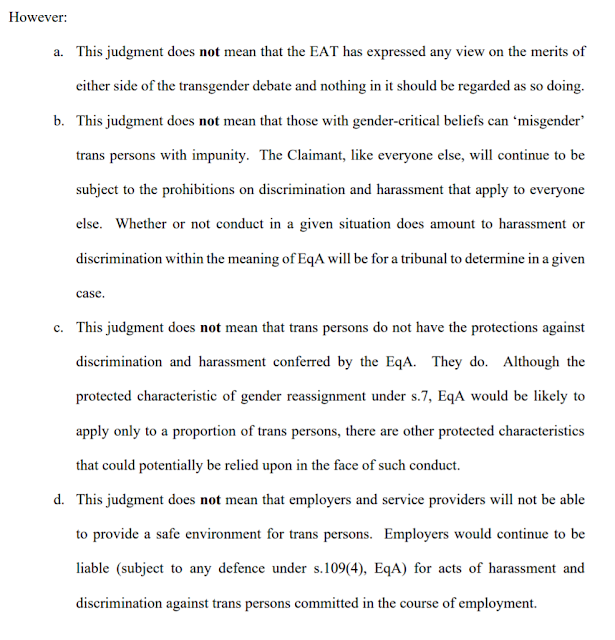Summary:
Maya Forstater's Employment Tribunal hearing comes up soon. This is her second hearing: the judge in the first hearing dismissed her case with a controversial judgment that described her "gender critical" beliefs as "not worthy of respect in a democratic society". She appealed this judgment, and in June this year the Employment Appeals Tribunal (EAT) found that the judge had erred in law and her beliefs were protected under section 10 of the Equality Act. The EAT instructed that a second Employment Tribunal should consider whether the discrimination she complained about in the original hearing was "because of or related to" her beliefs. Forstater may or may not succeed in her discrimination case against her employer. She is far from the only person to hold "gender critical" beliefs: if
Topics:
Frances Coppola considers the following as important: gender, human rights, trans women
This could be interesting, too:
Maya Forstater's Employment Tribunal hearing comes up soon. This is her second hearing: the judge in the first hearing dismissed her case with a controversial judgment that described her "gender critical" beliefs as "not worthy of respect in a democratic society". She appealed this judgment, and in June this year the Employment Appeals Tribunal (EAT) found that the judge had erred in law and her beliefs were protected under section 10 of the Equality Act. The EAT instructed that a second Employment Tribunal should consider whether the discrimination she complained about in the original hearing was "because of or related to" her beliefs. Forstater may or may not succeed in her discrimination case against her employer. She is far from the only person to hold "gender critical" beliefs: if
Topics:
Frances Coppola considers the following as important: gender, human rights, trans women
This could be interesting, too:
Merijn T. Knibbe writes Christmas thoughts about counting the dead in zones of armed conflict.
Frances Coppola writes The West must no longer tolerate Israel’s human rights breaches
Chris Blattman writes If we elected more women would there be less war? Yes but not for the reasons you think
Frances Coppola writes The tangled web of sex and gender
Maya Forstater's Employment Tribunal hearing comes up soon. This is her second hearing: the judge in the first hearing dismissed her case with a controversial judgment that described her "gender critical" beliefs as "not worthy of respect in a democratic society". She appealed this judgment, and in June this year the Employment Appeals Tribunal (EAT) found that the judge had erred in law and her beliefs were protected under section 10 of the Equality Act. The EAT instructed that a second Employment Tribunal should consider whether the discrimination she complained about in the original hearing was "because of or related to" her beliefs.
Forstater may or may not succeed in her discrimination case against her employer. She is far from the only person to hold "gender critical" beliefs: if the Tribunal concludes that her employer was right to dismiss her, then other people might feel unable to express their beliefs for fear of losing their jobs. In my view such censorship is unacceptable in a free society. In the interests of free speech, therefore, I support Forstater's case - though my support is not uncondititional, as I shall explain later.
But that does not mean I endorse her beliefs or her behaviour. Forstater and her supporters aggressively promote their beliefs on Twitter, hijacking threads to grandstand their agenda, forcing their opinions on people who have not invited them, misrepresenting what people have said then gaslighting them when they object, using emotionally-loaded language to short-circuit rational argument, resorting to ad hominem attacks and appeals to authority, insulting people who disagree with them, sealioning people who try to disengage. In short, behaving just like all the other cults that infest this increasingly toxic space. The effect of their behaviour is to prevent rational debate and silence dissenters.
While I sympathise with their emotional intensity, reducing this complex and difficult subject to a simplistic binary definition solves nothing. All it does is arbitrarily exclude some of the most vulnerable people in our society from the rights and protections that others enjoy, at potential risk to their health and even their lives.
Currently, the law permits people who are born one sex to transition legally to another. Whether someone is a "woman" is no longer determined by their biological sex at birth. Forstater entirely rejects this. For her, gender is determined only by biological sex, is set at birth and is immutable. She therefore denies that people who were born male can ever become women. And she therefore demands that trans women who were born male but are now legally female should be denied access to women's safe spaces.
In part, her argument is one of safety. And she has a point. Predatory cisgender men can. and do, masquerade as trans women in order to gain access to women's safe spaces. And some trans women are predatory. Allowing trans women into women's safe spaces is a risk. But that risk can't be eliminated by refusing to recognise trans women as women and denying them the rights and protections enjoyed by other women. Trans women are every bit as vulnerable to male predatory behaviour as other women. They need and deserve the same protection.
But Forstater goes further. Not only would she exclude trans women from women's safe spaces, she would also exclude women who, in her words, "look like men", regardless of their biological sex. This is laid out in this chilling excerpt from her essay "The Trans Men Gotcha":
This amounts to saying that whether someone is "a woman" should depend entirely on how they are perceived by other women, not their biological sex. This is complete reversal of Forstater's main argument, which is that biological sex alone should determine whether someone is a woman. It opens the door to bullying and exclusion of some women on wholly arbitrary grounds. And it is unworkable, whether or not biological sex is the sole determinant of gender. A situation in which someone is legally a woman but denied the rights and protections enjoyed by other women purely on the grounds of her appearance is discrimination.
On Twitter, Forstater's supporters insisted that she did not mean to exclude biological females from women's spaces. But as I shall explain, I'm afraid that it is impossible to read this in any other way. Forstater is arguing that people who do not - as she puts it - "read" as their legal gender should be denied access to facilities intended for the exclusive use of people of their gender.
Forstater discusses a real-life case in which a trans man was excluded from men's facilities because he did not look male. The man was not forced to use the ladies: instead, he was shown to, in Forstater's words, "a unisex, accessible toilet". Presumably this was the toilet intended for use by people with disabilities. But people with disabilities need their own facilities. Forstater's proposal to use their dedicated facilities as a dumping ground for people she does not want to see in women's safe spaces violates the rights of people with disabilities.
The trans man in this case objected to being directed to the accessible toilet, and sued the venue. The venue settled out of court for £1,500, and promised that in future he could use the men's toilets. But Forstater isn't at all happy with this:
The legal implications of forcing people who do not "look like" their legal gender to use facilities that are separate from those used by other people of their gender appear to be totally lost on Forstater. It effectively defines them as not-men and not-women. This is an explicit violation of their human rights and, to the extent that it raises the risk of abuse and harassment (and it does, because such facilities would be an obvious target for predatory men) potentially a flagrant breach of the Equality Act. It is, to put it bluntly, discrimination. That's why the venue settled out of court. That's why in future, the trans man in this case will be able to use the men's toilets.
So having denied the right of people who don't "look like" their legal gender to use facilities intended for the exclusive use of people of that gender, Forstater then explicitly denies that trans women are legally women anyway:
Cisgender men can, of course, legally be refused entry to women's changing rooms even if they are cross-dressers. But trans women who have Gender Recognition Certificates are legally women whether or not they have undergone gender reassignment. Retailers have no right under the law to deny them entry to women's changing rooms. Unless and until the law is changed to make gender once again entirely dependent on biological sex, Forstater's statement is, and will remain, wrong.
M&S's solution was to make its changing rooms non-gender. Forstater isn't happy with this, either. Once more wilfully misgendering trans people, she argues that M&S should have excluded "males" from its changing rooms:
M&S is not "entitled by the Equality Act" to exclude registered trans women from its changing rooms. On the contrary, if it excluded them because of their biological sex and/or their appearance, as Forsater wants, it would be a flagrant breach of the Equality Act. I hope Forstater has better lawyers in her tribunal hearing than whoever was advising her on this piece.
Admittedly, M&S's solution is somewhat insensitive. M&S could have provided small segregated spaces for women uncomfortable with non-gender changing facilities. But I am old enough to remember when M&S didn't have changing rooms at all. Women took their purchases home, tried them on in the privacy of their own bedrooms, then returned them free of charge if they were not to their liking. And of course this is what everyone does with online purchases now anyway. Changing rooms aren't essential any more. So if women are uncomfortable with trans women being in the women's changing rooms, they have an alternative. I suspect this is why M&S hasn't bothered to provide small segregated spaces.
If the social norm in the UK were for facilities to be non-gender, the solution to Forstater's problem would be for retailers, gyms and the like to provide small segregated spaces for people who are uncomfortable using non-gender facilities. But currently, this is not the norm. The norm is gender segregation. And excluding people who are legally women or men from facilities intended for people of their gender is illegal, whatever Forstater may think. Rather than excluding trans people from gendered spaces, perhaps people who are uncomfortable with trans people being present should remove themselves to the disabled toilets? I jest, of course, but this is no more unreasonable than Forstater's argument that trans people should remove themselves to the disabled toilets.
The solution to the risks that predatory men pose to women cannot be to exclude some women from women's spaces for fear that they might be predators. We cannot ensure the safety of one group by violating the rights of another. We need to find a solution that doesn't violate anyone's rights. And we shouldn't kid ourselves that this will be easy. Simplistic binary "solutions" that depend on wilfully refusing to recognise someone's legal gender are unacceptable in a free society. They are also illegal.
My views on this are supported by the EAT judgment. Forstater won her argument that her beliefs should be protected, but the judges were at pains to say that this did not mean that they endorsed her beliefs, nor that the finding in any way compromised the rights of trans people:
The EAT's judgment implies that expressing gender critical views on Twitter probably isn't sufficient grounds for dismissal. But this does not mean there are no grounds for Forstater's dismissal. Indeed, the points above give guidance to the Employment Tribunal as to what conduct would be grounds for dismissal.
I suspect that whether Forstater succeeds in her forthcoming Employment Tribunal hearing will hang on b) and d) above. Did she "misgender" trans people while in employment? She said in her evidence to the EAT that she would not normally "misgender" someone, but there would be occasions when she would do so, for example if she found someone she believed to be male in a women-only space. And she certainly misgendered trans people in the essay I have discussed above. Her repeated use of the term "male" to mean both cis men and trans women was explicit denial of trans women's legal identity and therefore their rights under the law.
It will be for the employer to prove that Forstater misgendered trans people to their detriment while she was in their employment and that they were therefore right to dismiss her. I said earlier that on balance, I think she should succeed in her case. But that was on the basis that the views she expressed did not harm anyone. If her behaviour while in employment caused actual harm or distress to any trans woman or man, she fully deserves to have the book thrown at her.






